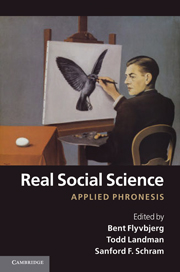Book contents
- Frontmatter
- Contents
- Figures
- Tables
- Contributors
- Acknowledgements
- 1 Introduction: new directions in social science
- Part I Theory and method
- 2 Phronetic social science: an idea whose time has come
- 3 Phronesis and narrative analysis
- 4 The feel for power games: everyday phronesis and social theory
- 5 Phronesis, projects and power research
- Part II Applied phronesis
- 6 Why mass media matter and how to work with them: phronesis and megaprojects
- 7 Power and conflict in collaborative research
- 8 Unsettling a settler society: film, phronesis and collaborative planning in small-town Canada
- 9 Phronesis and critical policy analysis: Heathrow's ‘third runway’ and the politics of sustainable aviation in the United Kingdom
- 10 Amnesty in the age of accountability: Brazil in comparative context
- 11 Feminist phronesis and technologies of citizenship
- 12 Making the teaching of social justice matter
- 13 Spatial phronesis: a case study in geosurveillance
- 14 Important next steps in phronetic social science
- Index
- References
2 - Phronetic social science: an idea whose time has come
Published online by Cambridge University Press: 05 June 2012
- Frontmatter
- Contents
- Figures
- Tables
- Contributors
- Acknowledgements
- 1 Introduction: new directions in social science
- Part I Theory and method
- 2 Phronetic social science: an idea whose time has come
- 3 Phronesis and narrative analysis
- 4 The feel for power games: everyday phronesis and social theory
- 5 Phronesis, projects and power research
- Part II Applied phronesis
- 6 Why mass media matter and how to work with them: phronesis and megaprojects
- 7 Power and conflict in collaborative research
- 8 Unsettling a settler society: film, phronesis and collaborative planning in small-town Canada
- 9 Phronesis and critical policy analysis: Heathrow's ‘third runway’ and the politics of sustainable aviation in the United Kingdom
- 10 Amnesty in the age of accountability: Brazil in comparative context
- 11 Feminist phronesis and technologies of citizenship
- 12 Making the teaching of social justice matter
- 13 Spatial phronesis: a case study in geosurveillance
- 14 Important next steps in phronetic social science
- Index
- References
Summary
Some critics of mainstream social science argue that the very idea of a social science is an oxymoron, at least when it is done in ways that strictly mimic the most prominent versions of science: that is, the natural sciences. Part of this critique stems from the realization that, given their respective subject matters, the natural and social sciences are entirely different enterprises. The natural sciences are focused on prediction and control of the natural world, making them the wrong place to look for a model about how to produce scientific knowledge that can inform social relations. Rather than mimicking the natural sciences, social science is arguably practiced best when it produces knowledge that the people being studied can themselves use to address better the problems they are experiencing.
It turns out that there is good news on the social science front these days. Some critics who do not entirely dismiss the idea of a social science as a science have gone beyond their criticisms to not only offer viable alternatives but to actually implement them, demonstrating that an alternative science that is more consistent with and relevant to the social nature of its subject matter is in fact entirely possible. In recent years, a confluence of alternatives has been developing that to varying degrees embrace this ethic. Interpretive approaches in particular feature the study of social relations from the perspective of the people being studied and have gained more visibility in recent years (Yanow and Schwartz-Shea 2006), as has participatory action research that involves active collaboration of researchers and the researched (Naples 2003). ‘Phronetic social science’ is one prominent example of this renewal in social science. It, however, has so far existed mostly in theory, with only a few examples of application to practical issues in policy, planning and management. The aim of Real Social Science is to rectify this deficiency in the literature by bringing together case studies illustrating phronetic social science in practice.
- Type
- Chapter
- Information
- Real Social ScienceApplied Phronesis, pp. 15 - 26Publisher: Cambridge University PressPrint publication year: 2012
References
- 26
- Cited by



